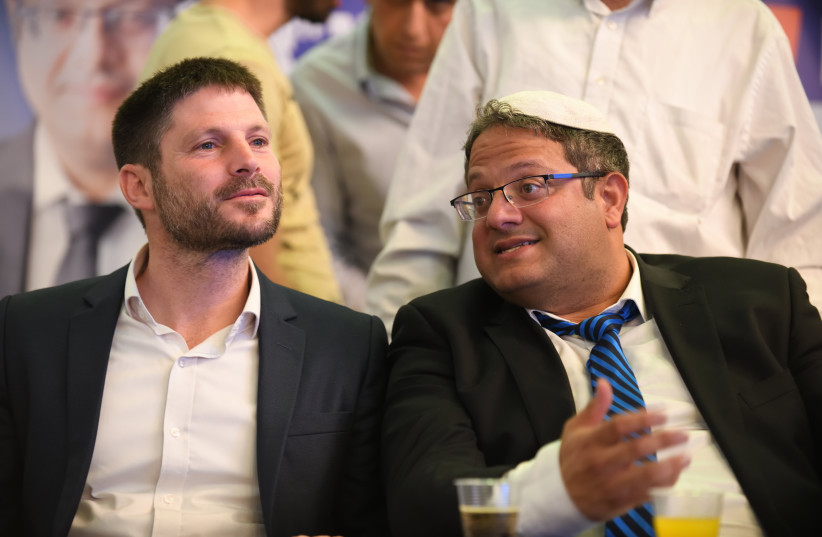Palestinians are extremely worried about the possible rise of the far Right to power in Israel as a result of Tuesday’s general election, a senior Palestinian Authority said on Sunday.
“We consider the elections an internal Israeli affair,” Ahmed al-Deek, senior adviser to the Palestinian Minister of Foreign Affairs, told The Jerusalem Post. “The results of the elections will have a direct impact on the Palestinians in particular and the [Israeli-Palestinian] conflict in general.”
“The results of the elections will have a direct impact on the Palestinians in particular and the [Israeli-Palestinian] conflict in general.”
Ahmed al-Deek
Deek expressed hope that the results of the election would lead to the emergence of a “real partner for peace” on the Israeli side.
“We want to see a partner that is prepared and willing to engage in a peace process with the Palestinian partner,” he said. “We hope that these elections will lay the foundation for the revival of the peace process.”

What does the Palestinian Authority think about the Israeli far Right rising to power?
Referring to public opinion polls that show a sharp increase in the popularity of the far-right Religious Zionist Party headed by Bezalel Smotrich and Itamar Ben-Gvir, Deek said the PA “ looks very seriously” at the rise of such candidates to power.
“This is a dangerous indication that will have a very negative impact on Israeli-Palestinian relations,” Deek cautioned, referring to the results of the public opinion polls that place... [the Religious Zionist Party] as the third-largest party. “If these extremists come to power and form an alliance with [former prime minister Benjamin] Netanyahu, this will open the door wide open to an escalation of the conflict. The rise of these extremists to power will trigger more fires that are hard to control.”
Asked whether the return of Netanyahu and the right-wing to power could actually help the Palestinians in their campaign against Israel in the international arena, Deek said the Palestinians have never ceased their activities to explain to the world the challenges and threats facing the Middle East peace process.
“Until when will Israel continue to avoid fulfilling its obligations under the terms of the peace agreements signed with the Palestinians?” the senior PA official asked.
ASKED WHETHER the Palestinians had missed an opportunity to resume the peace process with Israel during the outgoing government of Prime Minister Yair Lapid and his predecessor Naftali Bennett, Deek said it was Israel that did not want to return to the negotiating table.
“This [Israeli] government was even boasting that it does not want to resume the peace process with the Palestinians,” Deek noted. “For us, the real question now is whether the upcoming elections produce a peace partner in Israel that is capable of conducting a serious peace process with the Palestinians. The Palestinians are ready to resume the peace process. Or will the election reproduce the crisis with the Palestinians? Until when will successive Israeli governments continue to deny the legitimate rights of the Palestinians?”
In response to a question asking if the PA leadership has prepared a plan for dealing with the results of the elections and a new right-wing government in Israel, he replied, “We will continue to fight for the rights of our people on many fronts. We will continue to hold the Israeli government responsible [for the ongoing conflict]. We will also continue to demand that the international community assume its responsibilities toward the conflict and halt the Israeli aggression against the Palestinian people.”
Deek said the PA will continue to demand that the international community work toward achieving a two-state solution to the conflict, notwithstanding the results of the elections in Israel.
The international community, which supports the two-state solution, he added, must force Israel to stop its unilateral measures that threaten the establishment of a Palestinian state.
Deek acknowledged the recent wave of violence in the West Bank plays into the hands of the right-wing parties and candidates in Israel. However, he blamed Israel for instigating the violence “to avoid fulfilling its commitments toward the peace process.”
According to Deek, Israeli governments have long been seeking to replace political solutions with military and security measures against the Palestinians.
The PA is nevertheless prepared to deal with any elected government in Israel, including a new Netanyahu-led coalition, the PA official stressed.
“What is important for us is the program of the new government,” he said. “If the program is based on negotiations and peace, we are ready. But if the program is based on hostility toward the Palestinians, then we will have to take our decisions. We already have the decision of the PLO Central Council [to halt security coordination and suspend all agreements with Israel]. Israelis need to understand that the occupation and the settlements are the reason why the conflict is continuing.”
Addressing the Israeli public, Deek said, “It’s time for the Israelis to display responsibility. Do you want peace or are you against peace?”
